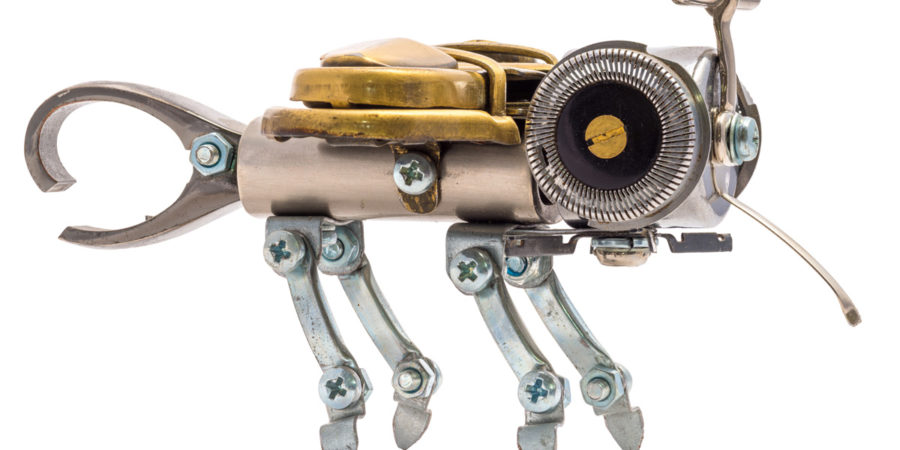
“Protecting bees is an ecological duty, pushing them to extinction is an ecological crime.
The threat to bees is a threat to humanity”
By Dr Vandana Shiva, President of Navdanya International
“If the bee disappeared off the face of the earth, man would only have four years left to live.”
― Maurice Maeterlinck, The Life of the Bee[1]
In the last 50 years agrotoxins have spread and are pushing bees to extinction.
The choices before humanity are clear, a Poison Free Future to save Bees, Farmers, our Food and Humanity. Or continue to use poisons, threatening our common future by walking blindly to extinction through the arrogance that we can substitute bees with artificial intelligence and robots.
“Robotic bees could pollinate plants in case of insect apocalypse”, ran a recent Guardian headline reporting how Dutch scientists, “believe they will be able to create swarms of bee-like drones to pollinate plants when the real-life insects have died away”.[2] [3]
“We see a crisis in 15 years where we don’t have enough insects in the world to actually do pollination and most of our vitamins and fruits are gone,” said Eylam Ran, CEO of Edete Precision Technologies for Agriculture. His company says its artificial pollinator can augment the labours of – and eventually replace – bees. Its system mirrors the work of the honey bee, beginning with a mechanical harvest of pollen from flowers and ending with a targeted distribution using LIDAR sensors, the same technology used in some self-driving cars”.[4]
There is no substitute for the amazing biodiversity and gifts of bees.
Every culture, every faith has seen the bees as teachers – of giving, of creating abundance, of creating the future of plants through pollination, and contributing to our food security and welfare.The next generation of seed is transformed into the next generation of seed only through the gift of the pollinator.
Navdanya’s research has shown that more than 30% of the food we eat is produced by bees and pollinators.
Nature’s economy is the gift economy. In every tradition the bee has been exemplified as a teacher in giving.
Buddhist texts note that from a multitude of living things, bees and other pollinating animals take what they need to survive without harming the beauty and vitality of their source of sustenance. For humans, to act in the manner of bees is an enactment of compassionate and conscious living.
St. John Chrysostom of the Catholic Church wrote, “The bee is more honored than other animals, not because she labors, but because she labors for others.” (12th Homily)
In the Islamic tradition, the Quran’s 16th chapter is titled ‘The Bee’. This chapter is known to be the revelation of God.
In the Hindu tradition, there is a wonderful quote in the scripture Srimad Mahabhagavatam which reads, “Like a honey bee gathering honey from all type of flowers the wise men search everywhere for truth and see only good in all religions.”
Let us together as diverse species and diverse cultures and through poison free organic food and farming, rejuvenate the biodiversity of our pollinators and restore their sacredness. We have the creative power to stop the sixth mass extinction and climate catastrophe without the need for these false technocratic solutions.
[1] Maurice Maeterlinck is a Nobel Prize winner from Belgium https://www.nobelprize.org/prizes/literature/1911/maeterlinck/biographical/
[2] https://gmwatch.org/en/news/latest-news/18543
[3] https://seedfreedom.info/wp-content/uploads/2018/11/The-Future-of-Our-Daily-Bread-_-LowRes-_-19-11-2018-REVISED.pdf
[4] With bees on decline, mechanical pollination may be solution
Photo icon by extradeda
Also read:
“Honeybees pollinate 71 of the 100 most common crops that account for 90% of the world’s food supply.” A Fact Sheet on Bees and Pollinators. 🐞🐝#WorldBeeDay #savebeesandfarmers @NavdanyaBija
https://t.co/m1NY8hxASq— Navdanya International (@NavdanyaInt) May 19, 2020
The next generation of seed is transformed only through the gift of the pollinator. Nature’s economy is the gift economy. In every tradition the bee has been exemplified as a teacher in giving. @drvandanashiva🐞🌷🐝 #WorldBeeDay #savebeesandfarmers https://t.co/kwXgtxBLXV
— Navdanya International (@NavdanyaInt) May 19, 2020
On #WorldBeeDay, @drvandanashiva has a Message for the World: Poisons Mean Extinction: For Bees and Humanity https://t.co/Uw0dP7IN1i “Protecting bees is an ecological duty, pushing them to extinction is an ecological crime.”
— Common Dreams (@commondreams) May 20, 2020
